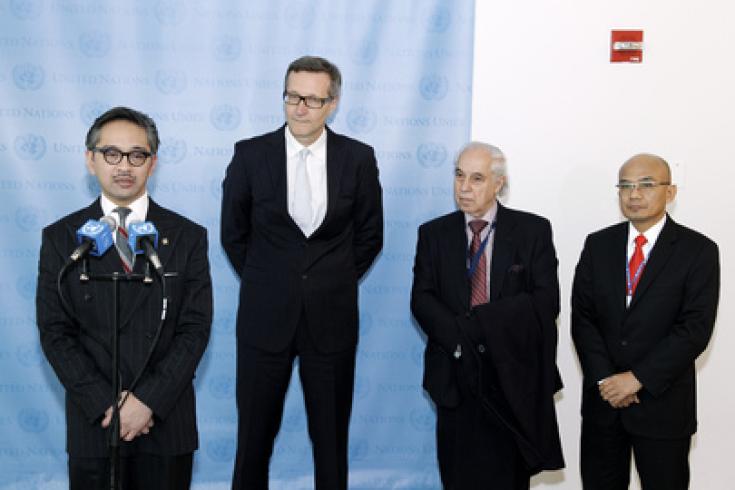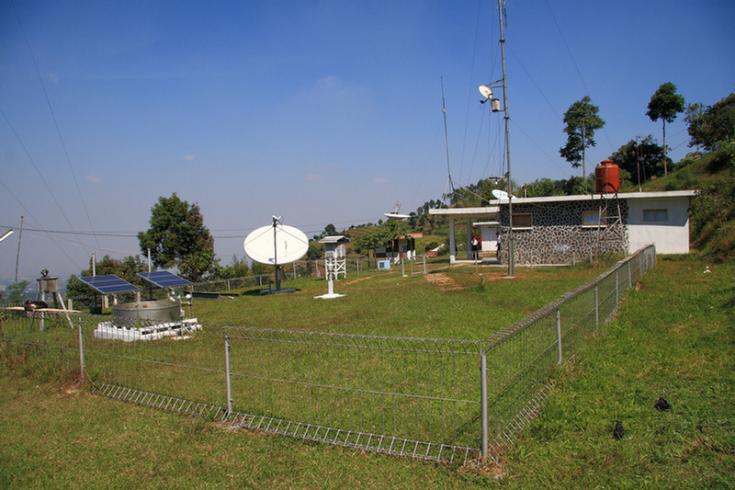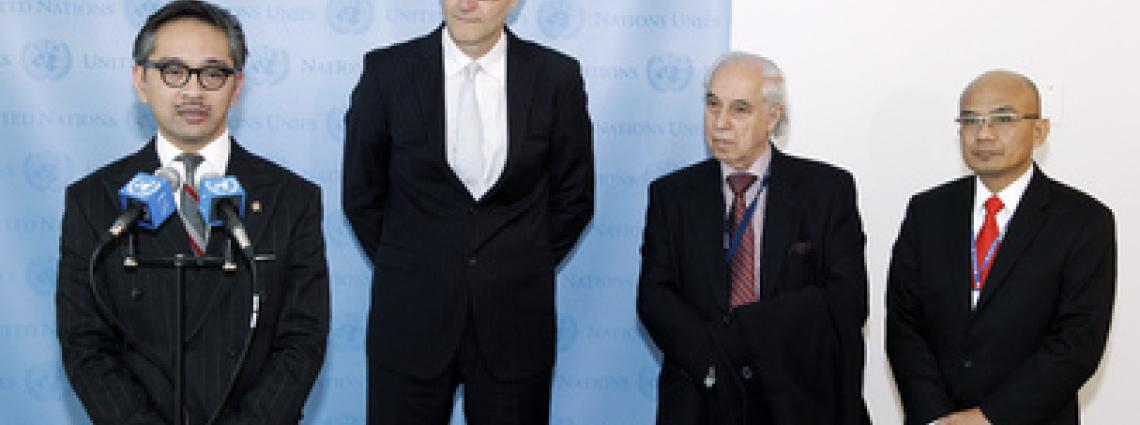Entry into force of Comprehensive
Nuclear-Test-Ban Treaty brought closer
by Indonesia's ratification - CTBTO Executive
Secretary Tibor Toth
Nuclear-Test-Ban Treaty brought closer
by Indonesia's ratification - CTBTO Executive
Secretary Tibor Toth
Update - 6 February 2012: Indonesia's ratification now formalized

(From left to right) Marty Natalegawa, Indonesian Foreign Minister, Tibor Tóth, CTBTO Executive Secretary; Sergio Duarte, UN High Representative for Disarmament; Desra Percaya, Permanent Representative of Indonesia to the UN. (UN Photo/Paulo Filgueiras)
“I welcome today’s outcome of the vote in the Indonesian Parliament to ratify the Treaty,” Tóth said. “By this historic decision, the gap keeping the Treaty from entering into force has been narrowed down to eight countries.”

The vote took place around 12.00 local time - click to see video.
Indonesian Foreign Minister Marty Natalegawa
I am determined to ensure that Indonesia's decision today will create momentum to encourage others who are still holding out to do the right thing. And the only right thing is to ratify the CTBT now, no more procrastination, no more delaying because it is right, it is proper and it makes a more secure world.
“Indonesia will use its good relations to promote the Treaty in Asia and the Middle East and beyond and at the highest political level,” Hemly Fauzy, the Indonesian Parliament’s coordinator for the CTBT ratification process said during a recent visit by an Indonesian parliamentary delegation to the CTBTO headquarters in Vienna.
“We want our country to be at the vanguard of nuclear disarmament and non-proliferation,” said Fauzy. “We intend to extend our involvement in the CTBT beyond the Treaty’s ratification.” Support for the Treaty in the Indonesian Parliament was unanimous across its nine parties, he said.
Indonesian Foreign Minister Marty Natalegawa and CTBTO Executive Secretary Tibor Tóth speaking to the press after the ratification.
This is the day when Indonesia reconfirmed its leadership, its leadership as a founder of the ASEAN and NAM. This leadership is about saying NO to nuclear weapons and it is about saying YES to the Treaty that is part of eliminating nuclear weapons.
The CTBT’s stringent entry-into-force provision prescribes that all 44 designated nuclear technology holder countries must sign and ratify the Treaty in order to bring it into law. With Indonesia’s ratification, 36 have now done so. The remaining ones are China, the Democratic People’s Republic of Korea (DPRK), Egypt, India, Iran, Israel, Pakistan and the United States.
Click for interactive map to see if your country has signed and ratified the CTBT.
Indonesia currently chairs the Association of Southeast Asian Nations (ASEAN), whose 10 Member States have also concluded the Bangkok Treaty establishing the most comprehensive nuclear-weapon-free zone on Earth. The CTBT has been signed by all ASEAN Member States. Three - Brunei, Myanmar, and Thailand - have still to ratify as do Indonesia’s neighbours Papua New Guinea, Sri Lanka and Timor Leste.
The Indonesian Tsunami Warning Centre is one of 1,200 institutions worldwide receiving CTBTO monitoring data.
We will be making that appeal, that pressure and that encouragement to other countries...we have to create an irreversible sense of momentum.

One of the six hosted by Indonesia: auxiliary seismic station AS40 at Lembang, Jawa Barat.
The CTBT bans all nuclear explosions. To verify compliance, the CTBTO, the organization tasked with bringing it into force, is building a global verification regime. When complete there will be 337 facilities monitoring the planet, underground, the oceans and the atmosphere for any sign of a nuclear explosion. To date, 85 percent of the monitoring facilities send data to the CTBTO’s headquarters in Vienna, Austria, where they are processed and analyzed and then transmitted to the 182 Member States. On-site inspections to collect information on the ground in the case of a suspected nuclear explosion will complement the verification regime once the Treaty enters into force.
The press release in other languages:
Arabic Chinese English French Russian Spanish Indonesian Thai
We will provide loosely-cut video material on Indonesia’s ratification, including interviews with key players for download at: ftp://media.ctbto.org/.indonesia_ratification.
Thomas Mützelburg
T +43 1 26030 6421
E [email protected]
M +43 699 1459 6421 Kirsten Haupt
M +43 699 1459 6127
E [email protected]
Peter Rickwood
M +43 699 1459 6541
E [email protected]
I www.ctbto.org Connect with CTBTO on facebook, twitter, flickr and youtube.
